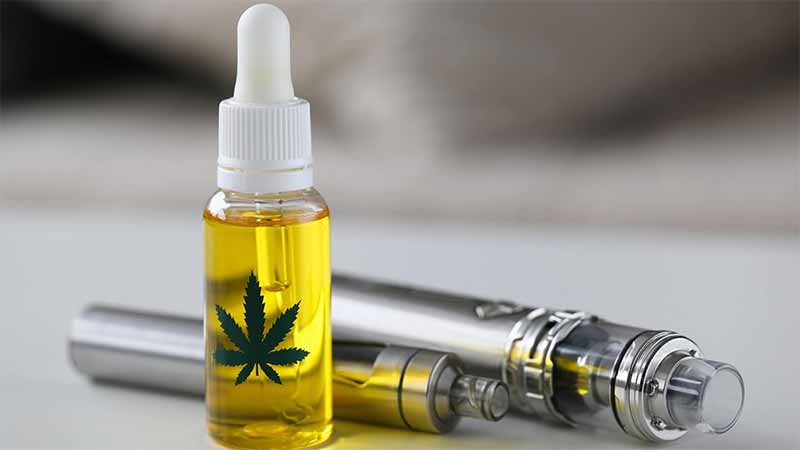No products in the cart.
Your Guide To CBD Vaping: Safety, Side Effects And More Leave a comment
Your Guide To CBD Vaping: Safety, Side Effects And More. The dangers of e-cigarettes are well documented, but the effects of vaping cannabidiol (CBD) aren’t common knowledge. CBD is often heralded in the wellness space as a natural way to help alleviate symptoms of anxiety and depression, relieve pain and improve sleep. However, these potential benefits can lead to confusion surrounding the health and safety of vaping the cannabinoid. Below, experts explain the science behind how vaping CBD affects the body and whether it’s a habit to engage in or avoid.
While the prevalence of cigarette smoking declined significantly in the past two decades, vaping is on the rise. An estimated 5.66 million adults in the U.S. vape, according to a 2020 JAMA Network scientific paper. Perhaps most alarming, over 2.5 million high school and middle school students vape, reports the 2022 National Youth Tobacco Survey from the Food and Drug Administration (FDA) and Centers for Disease Control and Prevention (CDC).
Your Guide To CBD Vaping: Safety, Side Effects And More
What Is CBD Oil?
CBD is one of many naturally occurring cannabinoids found in cannabis sativa and hemp plants. CBD oil is made by extracting the cannabinoid from the plant and dissolving it in a carrier oil, such as sunflower, hemp or olive oil. The oil can be consumed orally, applied topically and added to foods, drinks and other edible products. It can also be used in e-cigarettes.
CBD oil itself is linked to many potential benefits, most notably supporting mental health, improving sleep, alleviating pain and reducing inflammation. Its legality depends on how it’s sourced and specific state regulations. At the federal level, CBD derived from cannabis plants is illegal, but CBD derived from hemp plants that contains less than 0.3% delta-9-tetrahydrocannabinol (THC) by dry weight is legal.
Are CBD Vapes Safe?
When someone vapes CBD, they ingest more than the CBD oil itself, explains Irfan Rahman, Ph.D., a professor in the University of Rochester’s Department of Medicine and leading researcher on cigarette smoke-mediated lung inflammation and CBD vaping. The CBD oil is virtually always paired with other chemicals for flavor and often nicotine—both of which present their own dangers, he says.
Vijay Iyer, M.D., an interventional cardiologist and an associate professor of medicine at the University of Buffalo Jacobs School of Medicine and Biomedical Sciences clearly considers CBD vaping to be unsafe. “While CBD use by itself doesn’t seem to have any direct effect on heart function, we know that vaping is not good,” he says. Vaping anything isn’t good, he adds, so don’t fall for gimmicks like vaping vitamins, which are sometimes combined with CBD to make the products appeal to a more health-conscious audience.
Vaping CBD (or any substance) primarily affects the lungs and heart and is linked to both lung disease and heart disease, says Dr. Iyer. “Vaping irritates the lungs’ inner lining,” he explains, adding that researchers also believe vaping impairs the ability of the inner lining of the blood vessels to produce a substance called nitric oxide. “Nitric oxide keeps blood vessels nice and relaxed, reducing blood pressure,” he says. “The inability of blood vessels [to relax] can cause clotting and the blood vessels to constrict, which can raise blood pressure levels.”
While the act of vaping in and of itself is harmful, Dr. Rahman says the chemicals included in e-cigarettes with CBD oil for flavor and nicotine (which is often included as well) have their own specific downfalls. “The flavors have chemicals that are damaging to the lungs,” he says. As for nicotine, it’s not only addictive (which is why Dr. Rahman says it’s often included in CBD vaping products), but also increases a person’s risk of cardiovascular, respiratory and gastrointestinal disorders.
Your Guide To CBD Vaping: Safety, Side Effects And More
Potential Side Effects and Health Risks of CBD Vaping
Both experts say that someone who regularly vapes CBD oil isn’t likely to notice its harmful effects at first. In fact, Dr. Rahman says the immediate side effect of vaping CBD tends to be feelings of relaxation. But both experts say vaping is damaging and, over time, this damage can have a serious effect on a person’s health. The health risks of regular CBD vaping are listed below.
- Popcorn lung: Medically known as bronchiolitis obliterans, popcorn lung is marked by a buildup of scar tissue in the lungs, which blocks airflow, explains Dr. Iyer. This restriction makes it hard to breathe, causing wheezing, coughing and shortness of breath. Popcorn lung is irreversible and a cause of progressive lung damage.
- Lung or heart disease: Vaping damages blood vessels, which increases one’s risk of lung and heart disease, according to Dr. Iyer.
- Compromised immune health: While applying CBD topically or consuming it via food, drinks and other edibles is linked to immune health support, studies show vaping decreases immune health.
- Death: While data on vaping-related deaths specifically is sparse, at least 68 people between March 2019 and February 2020 died due to lung injury caused by vaping[3].
CBD Regulations and Counterfeit Product Problems
Current regulations surrounding CBD are riddled with loopholes and easy to bypass, which directly affects the safety of the CBD oil that ends up in e-cigarettes, explains Dr. Rahman. In his research, his team found that CBD oil in e-cigarettes often contains other ingredients, including MCT oil—which is used to preserve flavor and may cause acute lung toxicity when vaped—and THC. “Some companies add THC along with the CBD oil because [vaping it] has the person feeling really good, and then they want to come back and buy more,” says Dr. Rahman, emphasizing that this addition of THC can occur even when product packaging doesn’t indicate that it contains THC.
“The current laws on CBD need clarification [as a whole] and specifically in terms of vaporizing,” says Dr. Rahman. Currently, there’s no way for consumers to be sure of what they’re actually putting into their bodies when they’re vaping CBD, he adds. To his point, a 2019 study out of Virginia Commonwealth University found that four of nine CBD vaping liquids researchers tested contained a synthetic cannabinoid compound called 5F-ADB, which is an active ingredient in some synthetic cannabis products (such as Spice, K2, Black Mamba and Crazy Clown) that’s illegal in the U.S. due to its link to deathly overdoses[4].
Elevate your well-being naturally with Cornbread Hemp’s Whole Flower CBD Tincture !
Unlock the potential of CBD with enhanced bioavailability. Our Whole Flower Tincture is formulated for optimal absorption, ensuring you get the most from every drop for a truly transformative experience.
Your Guide To CBD Vaping: Safety, Side Effects And More
Healthier Alternatives to CBD Vapes, According to Experts
Good news: Dr. Rahman says that CBD vaping cessation can allow the lungs to heal from much of the damage caused by a past vaping habit. “The lungs are a beautiful system and can heal as long as the injury is minor,” he says. However, it’s very hard for the lungs to heal from severe damage, he adds, which is why the sooner someone stops vaping CBD, the better.
Both experts reiterate that CBD oil itself isn’t the problem, but rather the act of vaping it. For this reason, they say using CBD oil topically or consuming it orally in foods, drinks and gummies is a healthier habit to adapt.
If you vape CBD as a way to relax, both experts note there are much healthier ways to destress, including meditation, exercise (including going for a short walk) and yoga. If you vape CBD to cope with chronic pain, Dr. Iyer says applying a CBD cream directly to the inflamed area may be an alternative, though topical CBD products also lack clear regulations, he warns. The safest bet is to visit your health care provider, address your chronic pain and come up with a treatment plan together.














